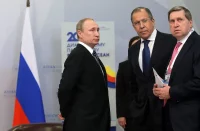A PR campaign conducted by the Arab League in recent years and attempts to dampen Iran’s “imperial ambitions” and prevent uncoordinated actions by Arab countries have proven ineffective.
And if the Arab League’s new head fails to make this pan-Arab organization over into a driving force in regional processes, the League will be fated to give its blessing to ambitious geostrategic projects of the world’s movers and shakers, as has been the case with Libya.
Sticking to its principles on Palestinian independence
In July, Nabil al-Arabi, the Arab League’s newly minted secretary general, said in Doha at the press conference following its regularly scheduled meeting that the organization would ask the UN to grant Palestine full membership in the organization and that it had decided to request UN recognition of a Palestinian state with its capital located in East Jerusalem.
That came as a surprise to no one, however.
First of all, the League’s leadership has stressed for years that the organization does not intend to “retreat a single step” from the Saudi initiative adopted at its 2002 meeting in Beirut. The main points of that initiative call for Israel to give up the territories it occupied in 1967 and recognize the right of Palestinian refugees to return for recognition of the State of Israel by the members of the Arab League.
Moreover, it seems that al-Arabi intends to outdo even his fellow countryman and predecessor, Amr Moussa, in pro-Palestinian and anti-Israeli rhetoric.
Which is not surprising. After all, in 2001 he was made a judge for an International Criminal Tribunal in The Hague, where he repeatedly spoke out against Israeli policies. In particular, he called the isolation of the Gaza Strip illegal and accused Israel of committing genocide against the Palestinians. In an interview to Egyptian media in August that year he supported an initiative by Arab governments for an international investigation of Israel on charges of “genocide against the Arab people of Palestine.” Al-Arabi said at the time: “I personally support Arab and Muslim legal action for crimes committed by Israel.”
So his recent announcement about the possibility of canceling the Camp David Accords came as no surprise to those concerned with the Arab-Israeli problem.
Obviously, such determination and radicalism by the head of the Arab League regarding settlement of the Arab-Israeli issue are long overdue, since the organization has been playing catch-up with the rapidly developing events in the Middle East for years and is seen on the Arab street as having little authority and being “all talk and no action.”
The the League’s recent reaction to the events in Syria provides another telling example of this.
An attempt to exploit the Syrian issue
In late August, the Arab League held a foreign minister level meeting in Cairo, during which the pan-Arab organization finally addressed the Syrian situation more or less clearly.
After the meeting, the foreign ministers of the League’s member nation’s issued a statement calling on Damascus to “act reasonably,” stop the bloodshed in the country “before it is too late,” and respect the “legitimate demands of the Syrian people.”
The statement emphasized that stability in Syria is key to stability throughout the Arab world.
The meeting concluded with a charge for al-Arabi to take an initiative for resolving the crisis to Syrian President Bashir Assad in Damascus.
Remarkably, the details of the initiative have not been published by any of the Arab media. It has only been reported that the message contains a “concrete proposal” regarding the format for a dialogue with opposition forces on political, economic and social reforms.
Damascus immediately rejected the Arab League’s peace initiative, however. A statement released by Syrian government officials stressed that the League’s initiative constitutes “gross interference” in the country’s domestic affairs, violates the League’s charter and undermines Arab unity.
Moreover, Damascus’s official response stressed that the appeal by the foreign ministers of the Arab League member states violates the League’s own rules, and that the initiative runs counter to “the interests of the Syrian people.” Syrian spokesman Yousuf al-Ahmad demanded that the League stay out of ongoing events in Syria and simply give its full support to the Assad regime.
Incidentally, the Syrian opposition also rejected the Arab League’s proposals, calling them “unsatisfactory;” and it urged Arab countries to exert stronger pressure on Syria’s regime, since otherwise “the bloodshed will not stop.”
In general, the fact that everybody in Syria is ignoring the League’s resolutions gives its ambitious new secretary general serious food for thought.
Bringing up the rear in the Middle East
The Arab League’s PR campaign scene in recent years and its attempts to dampen Iran’s “imperial ambitions” and prevent Arab countries from acting independently (and thus in an uncoordinated fashion) have proven ineffective.
Therefore, the League’s ambitions for controlling what is going on in the region are, to put it mildly, a bit inflated.
Moreover, despite Egypt’s post-revolutionary problems, the struggle for regional leadership is continuing within the Arab League (primarily between Egypt and Saudi Arabia), and there is longstanding “jealousy” between the leading Arab countries.
In addition, in light of recent developments in the region representatives of the various Arab countries constantly suspect each other of playing up too much to Washington, and to the West in general. On the other hand, the Arab Spring exposed and intensified the intra-Arab and inter-Muslim Sunni-Shiite conflict.
As things stand, it is not the Arab states or associations such as the Arab League that are taking the lead; it is the so-called “extra-territorial Islamist organizations” (some experts are calling them “religious orders”)—as the situation in Iraq, Lebanon and the Palestinian territories (especially in the Gaza Strip) clearly indicated even before what transpired the first half of this year.
As a result of the unrest in the Arab world, Iran remains the only influential Islamic power in the region. Most regional international relations experts are convinced that Iran is the country currently most interested in engaging the “extraterritorial Islamist organizations” because it can use them to hamper the actions of the United States and several overly ambitious European countries in the region.
If the new head of the Arab League fails to transform it into a driver of regional processes soon (and the Palestinian and Syrian problems are terrific opportunities to do so), the League will find itself fated to give its blessing to ambitious geostrategic projects of the world’s movers and shakers, as has been the case with Libya.
Source: New Eastern Outlook














Comments